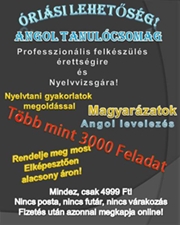Változatlan marad
|
had done |
I had done it. |
He said he had done it. |
|
would |
I would do it. |
He said he would do it. |
|
could |
I could do it. |
He said he could do it. |
|
should |
I should do it. |
He said he should do it. |
|
ought to |
I ought to do it. |
He said he ought to do it. |
|
might |
I might do it. |
He said he might do it. |
|
had better |
I had better do it. |
He said he had better do it. |
|
must |
I must sleep. |
He said he must sleep. |
A that kötőszó akár el is maradhat, ha mégis használjuk, sose tegyünk elé vesszőt!
A közelre mutató szavak helyébe a megfelelő távolra mutató szavak kerülnek, valamint a személyes névmások is értelemszerűen megváltoznak.
this - that: Pl.: "This is my book", Mike said. - Mike said that was his book. (Mike azt mondta, hogy ez az ő könyve.)
these - those: Pl.: "I've been watching you these ten minutes", John said. - John said he had been watching me those ten minutes. (John azt mondta, hogy már tíz perce engem figyel.)
here - there: Pl.: "I'm here", David said. - David said that he was there. (David azt mondta, hogy itt van.)
now - then: Pl.: "Now we go out", Peter said. - Peter said then they went out. (Péter azt mondta, hogy ők most elmennek.)
Ugyanígy: yesterday - the day before yesterday, tomorrow - the next day; this week - that week, last month - the month before, next (year) - the next, following (year), ... ago - ..: before stb.
Általában azt figyelhetjük meg, hogy az igeidők egyet lépnek visszafelé az eredetihez képest.
Nem kell időt egyeztetni a következő esetekben:
- ha örök érvényű igazságot, állandó szokást vagy tulajdonságot mondunk el.
Pl.: The lion is terrible, when hungry. - John said (that) the lion is terrible, when hungry. (John azt mondta, hogy az oroszlán rettenetes, amikor éhes.)
Pl.: Good news is always welcome. - John said (that) good news is always welcome. (John azt mondta, hogy a jó híreket mindig mindenki szívesen fogadja.)
- ha jövő idejű cselekvésre utalunk.
Pl.: He will be eighteen next year. - He said (that) he will be eighteen next year. (Azt mondta, hogy jövőre lesz tizennyolc éves.)
Pl.: They will do it tomorrow. - He said (that) they will do it tomorrow. (Azt mondta, hogy holnap megcsinálják.)
- ha az összetett mondatban Simple Past és Past Continuous együtt szerepel.
Pl.: They were sailing slowly when it happened: - He said (that) they were sailing slowly when the accident happened. (Azt mondta, hogy lassan vitorláztak, amikor a baleset történt.)
- wish, would rather, it is time esetén.
Pl.: I wish you were here. - He said (that) he wished you were there. - (Azt mondta, hogy bárcsak ott lennél.)
Pl.: I'd rather you waited. - He said (that) he would rather I waited. - (Azt mondta, hogy inkább várjak.)
A have to a következőképpen változhat meg:
ha a cselekvés ideje megegyezik a főmondatéval, akkor had to lesz belőle:
Pl.: I always have to drive carefully. - He said he always had to drive carefully. (Azt mondta, hogy mindig óvatosan kell vezetnie.)
- ha a cselekvés a főmondathoz képest a jövőre vonatkozik, akkor would have to lesz belőle.
Pl.: I have to be there by seven. - He said he would have to be there by seven. (Azt mondta, hogy hétre ott kell lennie.)
Feltételes mondatok esetén:
- a feltételes jövő igeidői egyet lépnek vissza, vagyis jelen időből múlt időbe kerülnek.
Pl.: I'll buy this car if I have more money. - He said he would buy that car if he had more money. (Azt mondta; hogy megveszi ezt az autót, ha sok pénze lesz.)
- a feltételes jelen és múlt igeidői nem változnak meg.
Pl.: If you came to me, I would show you my flowers. - She said if I went to her she would show me her flowers. (Azt mondta, hogyha elmennék hozzá, megmutatná a virágait.)
Ha a főmondat felszólítás, kétféleképpen változhat meg a feltételes mondat:
Pl.: Tell me the particulars, if you want I help you. - He told me to tell him the particulars if I wanted he helps me. - (Azt mondta, hogy mondjam el a részleteket, ha azt akarom, hogy segítsen.)
Ugyanez a mondat másképpen:
- He said if I wanted he helps me, I should tell him the particulars.
Amennyiben a függő beszéd mellékmondata van felszólító módban, akkor főnévi igeneves szerkezetet kell képezni (to + Infinitive).
Pl.: "Speak loud", Peter said. - Peter told me to speak loud. (Péter azt mondta, hogy beszéljek hangosan.)
"Don't be silly", Judy said. - Judy, told me not to be silly. (Judy azt mondta, ne legyek buta.)





